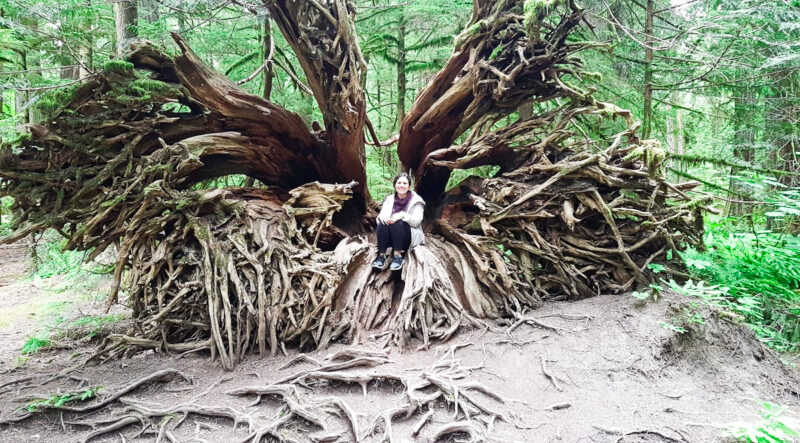BC’s Blue Revolution with Jaramar Balmori-Cedeño
“No one should have to wonder what they will eat tomorrow. I took an oath in Veterinary school in Mexico, and to this day, I live by it.”
By Samantha Bacchus McLeod
SeaWestNews
The newly unveiled Youth Council of the BC Salmon Farmers Association (BCSFA) is all about greening forward for sustainable aquaculture to feed Canada and the world. This strong group of young individuals, who are already making waves in aquaculture, will act as advisors for concepts brought forth by salmon farmers and as seafood ambassadors for BC. Over the next few months, SeaWestNews in a special series of Q and A presentations, will explore how members of BCSFA’s Youth Council play a role in British Columbia’s Blue Revolution. This segment on BC’s Blue Revolution features Jaramar Balmori-Cedeño, Fish Health and Food Safety Department, MOWI Canada West, and a member of the BCSFA Youth Council.
Tell us a bit about yourself.
“I grew up in Mexico City, where most of my family still is. My dad is a metallurgical engineer, my mom an architect. I have one younger sister, and 12 cousins that are like siblings to me”.
Your name is very unique, tell us about its meaning.
“My name comes from the Huichol language, from the Wixáritari indigenous people in Mexico. It means ´goddess of the sea´. In Mexico, we believe names have strength, and perhaps that is why I ended up making a career at sea. I carry my name with pride, a little part of Mexico always with me.”
How are you involved in BC’s salmon farming industry?
“I work in the Fish Health and Food Safety Department at MOWI. My work is directly involved with the health of our fish, from eggs to harvest. I am very lucky to be able to contribute in such a meaningful way.”
Do you remember a defining moment when you knew what you would like be when you grow up?
Yes! When I was 5 years old, I decided to become a veterinarian, and because I am very stubborn, followed through. During Vet school, I took an Aquatic Species class because I needed the credits, and never looked back.
I love that Veterinarian oath you mentioned, can you say it again for our readers?
“When you finish Veterinary school in Mexico, we are sworn to an oath, and part of it goes like this: “I shall ethically work in animal production, conserving the natural resources and avoiding ecological deterioration. I will follow legislation and the norms that rule us, and I will put my services to the benefit of humanity”.
Does working in the aquaculture fulfill that need to adhere to the oath?
“I studied Veterinary Medicine and Husbandry in Mexico, and later did my Masters in Pathobiology at the Ontario Veterinary College. Absolutely, aquaculture opened a world of possibilities to me, and to this day, I am extremely proud to be part of this industry.”
Is food security an issue in your birth country?
“Food insecurity is a big problem in Mexico. Around 40% of the population live in poverty. Veterinarians play a big role in providing food security, and Veterinary school in Mexico is heavily focussed towards solving this problem. No one should have to wonder what they will eat tomorrow. I took an oath, and to this day, I live by it.”
Do you think aquaculture plays a huge role in alleviating food scarcity?
“I have seen first-hand the role Aquaculture plays not only in food security, but in bringing socio-economic benefits to rural communities. I hope to continue my work providing healthy, sustainable food for the rest of my career.”
What do you think are the most crucial issues facing salmon farming in BC?
“I think there are 2 main issues that salmon will face. One is climate change. Although we don’t know how it will affect us and to what extent, we should start researching possible outcomes and preparing for it”.
And the second issue?
“I think people don’tt understand how salmon are raised. We are a highly regulated food sector, with people committed to sustainability, but that is not the image the general public has of us. Working towards educating the public about what we do is key to our success.”
How do you see the future of fish, both farmed and wild, in BC?
“I have always believed it is not wild vs. farmed, but wild and farmed. In the future, I hope we can work together towards a healthy, sustainable farmed and wild salmon industry. Instead of being stacked against each other, I wish to work in tandem towards solving our problems and obstacles. There is more strength in unity than in division.”
What are your hobbies?
“My hobbies are diving (although I still have to brave cold water diving), exploring new places, and I’ve recently taken to hiking as part of my regular activities.”
What is your favourite body of water?
“My favorite body of water is…the Cortéz Sea! My first contract was working around the Cortéz Sea doing calamari population surveys. I spent 2 weeks to a month at sea, and I remember those times fondly. The diving there is also amazing.”
Your favourite seafood dish and why do you like it?
“Top of my list of favourite seafood? Shrimp in any form! For Christmas, my uncle (who lives by the coast in Mexico) would bring all types of seafood and cook all afternoon. Shrimp was always the star. He would make it in cocktails, battered, in green salsa, wrapped in bacon, marinated with beer…one Christmas, he cooked it in 12 different styles. Every time I eat shrimp, it brings me back to Christmas, surrounded by family, with seafood at our table.”

